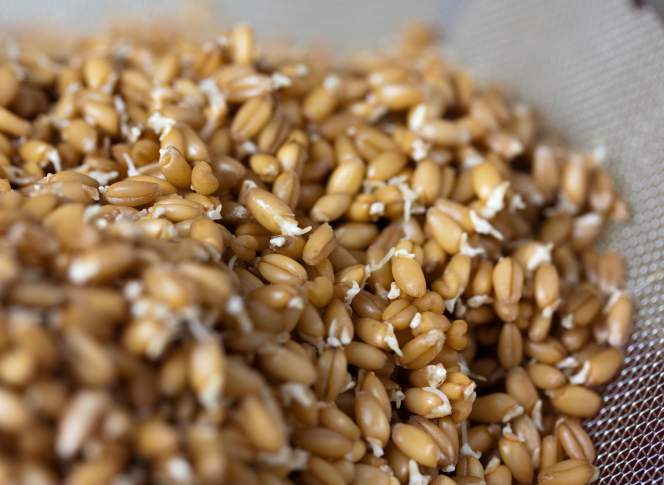A Closer Look At The Sprouted Grains Phenomenon
Sprouted grains are a popular new type of food hitting the shelves of grocery stores and kitchen cabinets.
October 17, 2016

Sprouted wheat berries

Sprouted grains are a popular new type of food hitting the shelves of grocery stores and kitchen cabinets. These whole grain products come from wheat, barley, rice or other cereal grains that are allowed to germinate and briefly grow a small sprout. The sprouted seeds can be processed in one of three ways: dried to be eaten like rice; dried and ground into a flour for bread or bread-like products; or kept wet and blended into a puree to be used in “flour-less” products. From these basic beginnings come a variety of breads, pastas, granolas and more.
The theory behind using sprouted grains is that allowing the seed to germinate enables it to release, create or make more available certain vitamins and minerals. This concept is scientifically sound and is intriguing for health-conscious consumers. Many products are now emerging, and research is beginning to to determine the specific nutrient content of sprouted grains and their effect on human health.
One of the common aspects of sprouted grainsthat researchers are looking atis an increase in the vitamin folate(known as folic acid in its synthetic form). Folate is a B vitamin commonly found in fruits, vegetables and fortified breads; it is important for heart health and prevention of a set of birth defects called neural tube defects.
While folate does tend to increase in seeds after they sprout, according to What We Eat in America, NHANES 2007-2010 (via the Scientific Report of the 2015 Dietary Guidelines for Americans Advisory Committee) most Americans already get enough of this vitamin by eating fortified breads. Eating sprouted grain breads instead of fortified breads may actually result in a net decrease in dietary folate. However, since sprouted grain products all differ, the exact change in folate intake is difficult to assess.
Another commonly claimed benefit is that sprouting grains will increase the bioavailability of minerals like iron, calcium, zinc and copper. In other words, the minerals in sprouted grains may be easier for the body to absorb than the minerals in traditional, ungerminated grain products. The increased bioavailability may be because sprouted grains have less phytate than traditional grain products.
Phytate (or phytic acid)is a substance found in whole grains that interacts with iron, calcium, zinc and copper to create a compound that is difficult for the body to absorb. A study publishedin the Journal of Agricultural and Food Chemistry found that when sprouted grains are also malted — that is, roasted after sprouting — they can lose even more phytate. The majority of sprouted products are not malted, however, and while sprouting alone can remove phytate, most Americans do not eat enough phytate to make a serious impact on mineral absorption.
Another typical claim is that sprouting grains will decrease the gluten they contain. When wheat is sprouted for longer periods of time under specific conditions, the components that comprise gluten decrease. In turn, this process is believed to decrease overall gluten in sprouted grain products. This line of thought is intriguing, but more research is needed to determine the extent to which gluten decreases and what the effect of sprouted grains is on people with gluten sensitivity.
At the end of the day, it is safe to say that sprouted grains are a healthy food. They appear to help the body like any other whole grain by preventing cardiovascular disease and obesity. However, there is not enough evidence to suggest that sprouted grains are any healthier than regular whole grains. They are a perfectly healthy option if they are preferred for their flavor, texture or other characteristics. People interested in sprouted grains should weigh the potential slight benefit of eating them against the premium price of these products.
Much more research needs to be performed before a more definitive conclusion can be drawn about sprouted grains. The full extent of their benefit is not quite clear, since no human studies with large sample sizes and practical consumption models have been performed. Many of the current studies use concentrated forms or large amounts of sprouted grains in their methods rather than amounts typically eaten as part of a free-living diet. Research must also investigate the effect of sprouted grains on those with gluten intolerance.
The Whole Grain Council, a nonprofit consumer advocacy group, provides further information about sprouted grains, including background about research into their health effects and recipes.
Beth Olson, Ph.D., is a nutrition specialist with the University of Wisconsin-Extension and an associate professorin the Department of Nutritional Sciences at UW-Madison. Robert Davis is an associate outreach specialist with the University of Wisconsin-Extension and a dietetic intern at Beth Israel Deaconess Medical Center in Boston.
 Passport
Passport











Follow Us